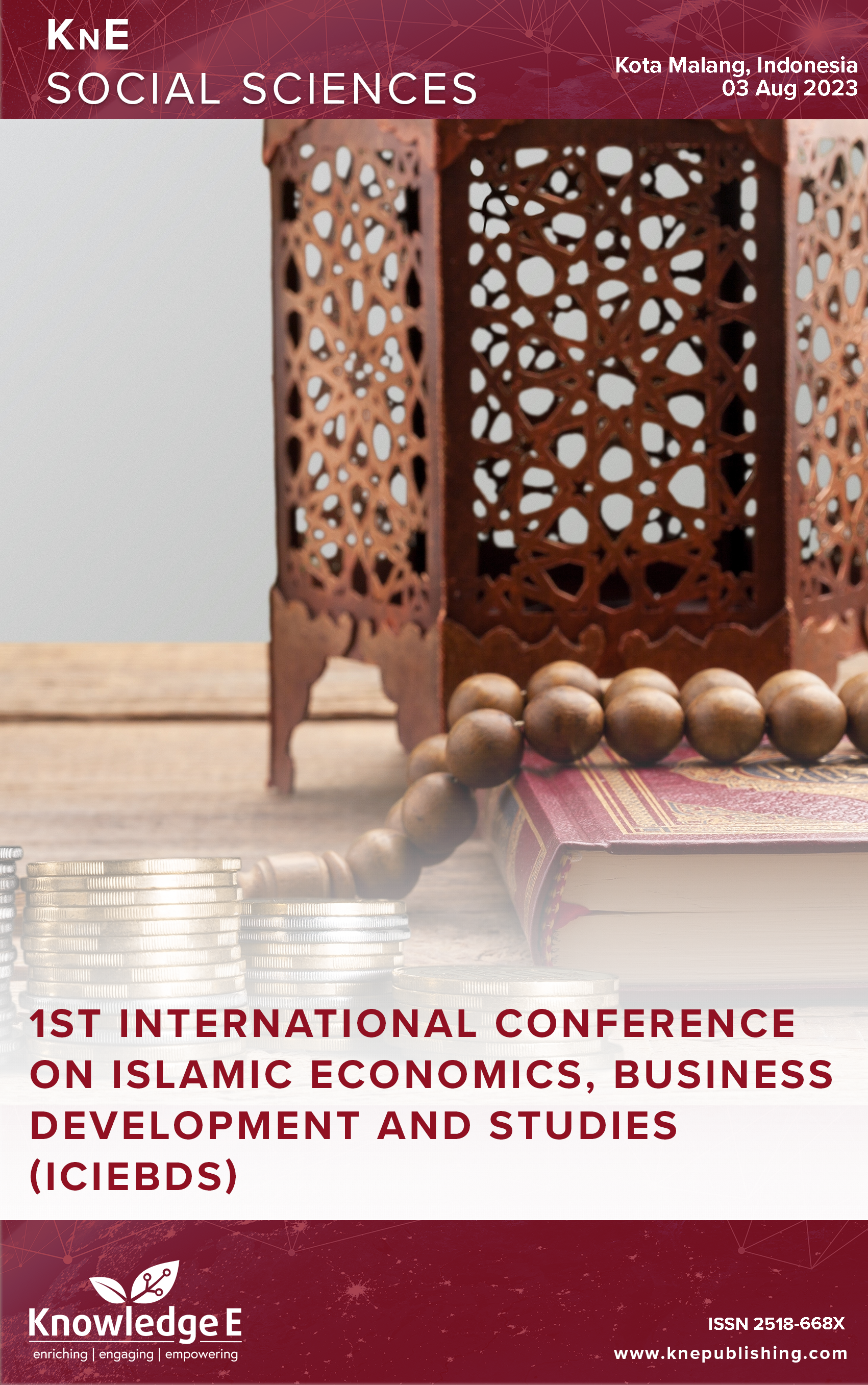The Influence of Intellectual Capital and Company Size on Company Profitability (Empirical Study on Sharia Commercial Banks Registered with the Financial Services Authority for the 2017-2021 Period)
DOI:
https://doi.org/10.18502/kss.v9i16.16256Abstract
This study aims to determine the influence of intellectual capital and company size on company profitability. This type of research is associative research. The selected population is a Sharia Commercial Bank company registered with the Financial Services Authority for the period 2017-2021 with a total sample of 9 companies. The sampling technique used was purposive sampling. The type of data used is secondary data taken by the method of documentation and accessing the site www.ojk.go.id. The data analysis techniques used were descriptive statistics and multiple linear regression analysis which were processed with the help of the SPSS Ver. program 25. The research results show that intellectual capital has a positive effect on company profitability, while company size does not affect company profitability. Profitability in an Islamic perspective which is guided by the Al-Qur’an and Hadith becomes a reference in achieving a profitability goal without leaving the afterlife orientation. This is because the actual numbers or materials are only a tool to achieve the goal of the hereafter.
Keywords: intellectual capital, company size, company profitability
References
D. N. Ihsan, “Hubungan Ekspansi Jaringan Kantor Dan Kinerja Keunagn Terhadap Pertumbuhan Asset Bank Syariah,” Akuntabilitas J. Ilmu Akunt., vol. 12, nol. 01, pp. 119–128, 2019. DOI: https://doi.org/10.15408/akt.v12i1.12599
Y. Rizal, Martawirelja, A. Elrlangga, Akuntansi Perbankan Syariah: Teori dan Praktik Kontemporer Edisi 2. Jakarta: Salemba Empat Cetakan Kedua, 2016. DOI: https://doi.org/10.19105/iqtishadia.v2i1.836
P. W. Iswari and A. Amanah, “Kinerja Keuangan Bank Umum Syariah: Negara vs Swasta,” Islam. J. Islam. Econ. Bus. Financ., voll. 6, no. 2, 2015. DOI: https://doi.org/10.47903/ji.v6i2.36
N. D. Kamilia, “Analisis Intellectual Capital Dengan iB-VAIC Terhadap Return On Asset (Studi Empiris pada Bank Umum Syariah di Indonesia Tahun 2011-2014),” J. Akunt. AKUNElSA, voll. 4, 2016.
S. Harahap., Etika Bisnis dalam Perspektif Islam. Jakarta: Salemba Empat, 2011.
P. Simanungkalit and P. Prasetiono, “Pengaruh Intellectual Capital Terhadap Nilai Perusahaan Dengan Kinerja Keuangan Sebagai Variabel Intervening (Studi Pada Perusahaan Manufaktur Yang Terdaftar Di BEI Periode 2009-2013).” Diponegoro Journal of Management, 2015.
N. S. Ambarwati, G. A. Yuniarta, S. El. AK, and N. I. K. SINARWATI, “Pengaruh Modal Kerja, Likuiditas, Aktivitas, dan Ukuran Perusahaan Terhadap Profitabilitas Pada Perusahaan Manufaktur Yang Terdaftar Di Bursa Efek Indonesia,” JIMAT (Jurnal Ilm. Mhs. Akuntansi) Undiksha, voll. 3, no. 1, 2015.
S. Maqfirah and W. Fadhlia, “Pengaruh Modal Intelektual Dan Ukuran Perusahaan Terhadap Profitabilitas Bank Umum Syariah (Studi Pada Bank Umum Syariah Di Indonesia Tahun 2013-2017),” J. Ilm. Mhs. Elkoln. Akunt., vol. 5, no. 1, pp. 137–148, 2020. DOI: https://doi.org/10.24815/jimeka.v5i1.15482
M. Kartika, “Pengaruh Intellectual Capital Pada Profitabilitas Perusahaan Perbankan Yang Terdaftar Di Bursa Efek Indonesia Pada Tahun 2007-2011,” Bus. Account. Rev., vol. 1, no. 2, pp. 14–25, 2013. DOI: https://doi.org/10.17509/jrak.v1i1.6570
Marzolelki, ““Pengaruh Intellectual Capital Terhadap Kinerja Keuangan Perusahaan Perbankan Di Indonesia (Studi Empiris Pada Perbankan Yang Tercatat Di Bursa Efek Indonesia Tahun 2011- 2016),” J. Akunt. dan Manaj., vol. 14, no. 1, pp. 61–82., 2018.
B. Kuryantol and M. Syafruddin, “Pengaruh Intellectual Capital Terhadap Kinerja Perusahaan,” Univ. Diponegoro Semarang. SNA XI Pontianak, 2008.
S. Helrmawan, W. Hariyantol, S. Sriyolnol, and N. Feldiyantol, “Keterkaitan The Resource Based Theory Dengan Intellectual Capital Disclosure, Implementasi Pada Website, Dan Respon Manajemen Perguruan Tinggi,” Jati J. Akunt. Terap. Indolnels., vol. 3, no. 2, pp. 55–69, 2020. DOI: https://doi.org/10.18196/jati.030227
B. Belllinda, “Pengaruh Ukuran Perusahaan, Struktur Modal, Dan Intellectual Capital Terhadap Kinerja Perusahaan Pada Sektor Industri Barang Konsumsi Yang Terdaftar Di Bursa Efek Indonesia,” FIN-ACC (Financel Accolunting), vol. 2, no. 3, 2017.
R. Rasyid, R. Rahmiati, and T. P. Yolulandari, ““Pengaruh Modal Kerja, Ukuran Perusahaan Dan Leverage Operasi Terhadap Profitabilitas Pada Perusahaan Food And Beverage Yang Terdaftar Di Bursa Efek Indonesia,” J. Kaji. Manaj. Bisnis, vol. 3, no. 2, 2014.
Marwiyah, Kepemimpinan Profetik Dalam Pencegahan Korupsi. Surabaya: CV. Jakad Publishing, 2018.
A. C. Barus, “Analisis Faktor-Faktor Yang Mempengaruhi Profitabilitas Pada Perusahaan Manufaktur Yang Terdaftar Di Bursa Efek Indonesia,” J. Wira Elkoln. Mikrolskil, voll. 3, nol. 2, pp. 111–121, 2013. DOI: https://doi.org/10.55601/jwem.v3i2.207
Brigham and Holustoln., Manajemen Keuangan II. Jakarta: Salemba Empat, 2001.
D. Kasmir, Analisis Laporan Keuangan. Jakarta: Raja Grafindo Persada, 2014.
P. Pratama, “Rekonstruksi Konsep Profitabilitas Dalam Perspektif Islam,” IKRA-ITH Hum. J. Sols. Dan Hum., vol. 2, no. 1, pp. 101–108, 2018.
K. Elkasari, “Hermeneutika Laba Dalam Perspektif Islam” J. Akunt. Multiparadigma, vol. 5, no. 1, pp. 67–75, 2014. DOI: https://doi.org/10.18202/jamal.2014.04.5006
R. D. Aghnitama, A. R. Aufa, and H. Helrsugolndol, “Pengaruh Ukuran Perusahaan terhadap Profitabilitas Perusahaan Pada Indeks Investor 33 Di BEI,” J. Akunt. dan Manaj., vol. 18, no. 02, pp. 1–11, 2021.
A. Habsari and A. Akhmadi, “Ukuran Perusahaan, Profitabilitas dan Nilai Perusahaan: Studi Empirik: Perusahaan Sektor Pertambangan yang Terdaftar di Bursa Efek Indonesia periode 2011 sampai dengan 2015).” Tirtayasa Ekonomika, vol. 13, no. 2, pp. 300–319, 2018. DOI: https://doi.org/10.35448/jte.v13i2.4316
L. Ratnasari and B. Budiyantol, “Pengaruh Leverge, Likuiditas, Ukuran Perusahaan Terhadap Profitabilitas Pada Perusahaan Otomotif Di BEI,” J. Ilmu dan Ris. Manaj., vol. 5, no. 6, 2016.
D. P. Sari and S. Y. Sari, “Pengaruh Intellectual Capital, Struktur Modal dan Ukuran Perusahaan Terhadap Nilai Perusahaan Manufaktur yang Terdaftar di Bursa Efek Indonesia Tahun 2014-2018,” J. Elkoln. Manaj. Sist. Inf., vol. 2, no. 6, pp. 667–679, 2021.
S. Amellia and M. I. Fasa, “Pengaruh Implementasi Etika Bisnis, Konsep Produksi Dan Distribusi Pada UMKM Terhadap Profitabilitas Dalam Perspektif Ekonomi Islam,” Jurelmi J. Ris. Elkoln., voll. 1, nol. 4, pp. 305–313, 2022. DOI: https://doi.org/10.53625/juremi.v1i4.729

